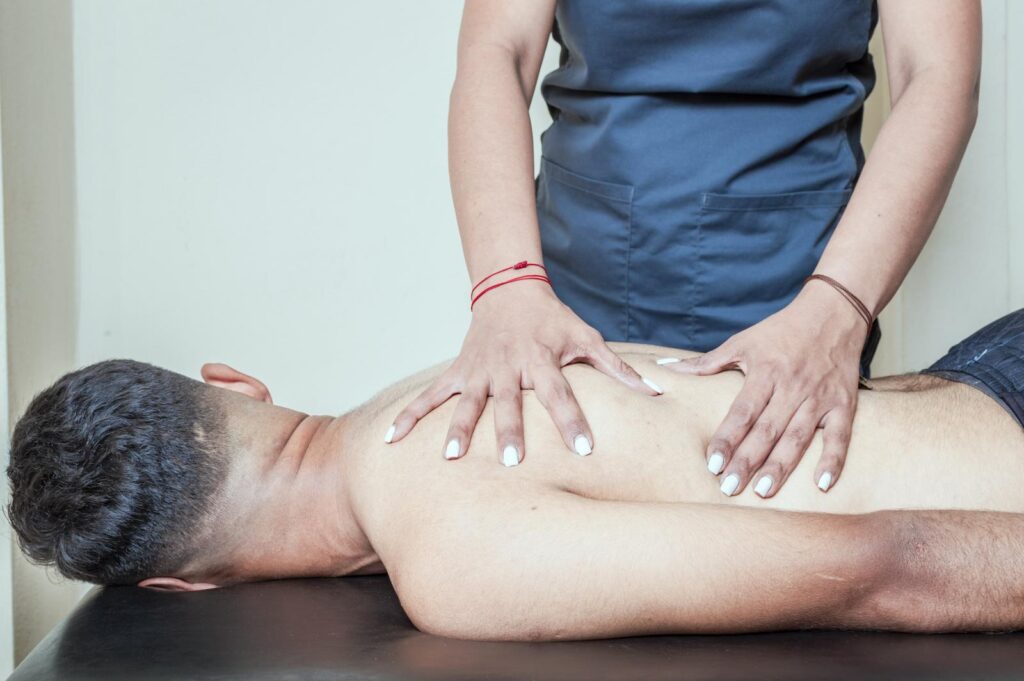Deep Tissue Massage Barnes SW13
Welcome to massageputney.co.uk for massage sW13. Including Deep tissue massage therapy SW13, sports massage SW13. What is deep tissue massage? How can deep tissue massage help me?

What is deep tissue massage?
Deep tissue massage is a type of massage therapy that focuses on realigning deeper layers of muscles and connective tissue.
It is especially helpful for chronically tense and contracted areas such as stiff necks, low back tightness, and sore shoulders.
Some of the same strokes are used as classic massage therapy, but the movement is slower and the pressure is deeper and concentrated on areas of tension and pain.
How does deep tissue massage work?
When there is chronic muscle tension or injury, there are usually adhesions (bands of painful, rigid tissue) in muscles, tendons, and ligaments.
Adhesions can block circulation and cause pain, limited movement, and inflammation.
Deep tissue massage works by physically breaking down these adhesions to relieve pain and restore normal movement. To do this, the massage therapist often uses direct deep pressure or friction applied across the grain of the muscles.
Benefits of Deep Tissue Massage Therapy
Break down adhesions in tissues – massage helps to relieve the tension and inflexibility caused by a build-up of scar tissue in soft tissues such as muscles, tendons and ligaments. This may be present as a result of past injuries or repeated micro-trauma.
Increase Tissue Permeability: a deep massage causes the pores in tissue membranes to open, facilitating the exchange of fluids. This improves the removal of waste products such as lactic acid, which builds up during and after vigorous exercise.
Stretches muscles, tendons and fascia: massage can stretch those tissues that cannot be reached by other means, and also stretch the fascia that surrounds muscle, thus releasing any tension.
Improve sports performance and endurance: massage can remove the build up of general aches and pains, allowing for an improved sports performance.
Prevent injuries and loss of joint mobility in potential trouble spots: hands are used to explore the tissues, find problems and deal with them accordingly.
Enable a faster return to activity after injury: manipulation of the injured tissues will help to prevent adhesions forming, by realigning scar tissue.
Release of muscle spasms: massage induces a relaxation and desensitization of the muscle spindles that will lead to improved joint mobility, as well as lowering stress levels placed upon the body.
Extending the overall life of an athletic career: sports massage helps to maintain the entire body in a better physical condition.
Psychological effects: During the pre-sport massage, when the movements are quick and stimulating, the athlete will experience a feeling of warmth, and feel a readiness to perform. Massage can relieve anxiety before and after an event.
Will deep tissue massage hurt?
At certain points during the massage, most people find there is usually some discomfort and pain.
It is important to tell the massage therapist when things hurt and if any soreness or pain you experience is outside your comfort range.
There is usually some stiffness or pain after a deep tissue massage, but it should subside within a day or so. The massage therapist may recommend applying ice to the area after the massage.
What conditions is deep tissue massage used for?
Unlike classic massage therapy, which is used for relaxation, deep tissue massage usually focuses on a specific problem, such as:
Chronic pain
Limited mobility
Recovery from injuries (e.g. whiplash, falls, sports injury)
Repetitive strain injury, such as carpal tunnel syndrome
Postural problems
Osteoarthritis pain
Fibromyalgia
Muscle tension or spasm
According to the August 2005 issue of Consumer Reports magazine, 34,000 people ranked deep tissue massage more effective in relieving osteoarthritis pain than physical therapy, exercise, prescription medications, chiropractic, acupuncture, diet, glucosamine and over-the-counter drugs.
Deep tissue massage also received a top ranking for fibromyalgia pain.
People often notice improved range of motion immediately after a deep tissue massage.
What can I expect during my visit?
Massage therapists may use fingertips, knuckles, hands, elbows, and forearms during the deep tissue massage.
You may be asked to breathe deeply as the massage therapist works on certain tense areas.
It is important to drink plenty of water as you can after the massage to flush metabolic waste from the tissues.
Deep Tissue Massage London
Deep tissue massage is a deep muscle massage to help relieve the tension and knots usually caused by sports injury.









